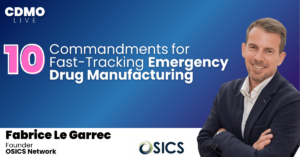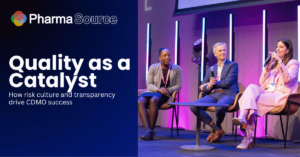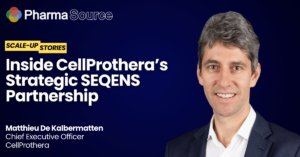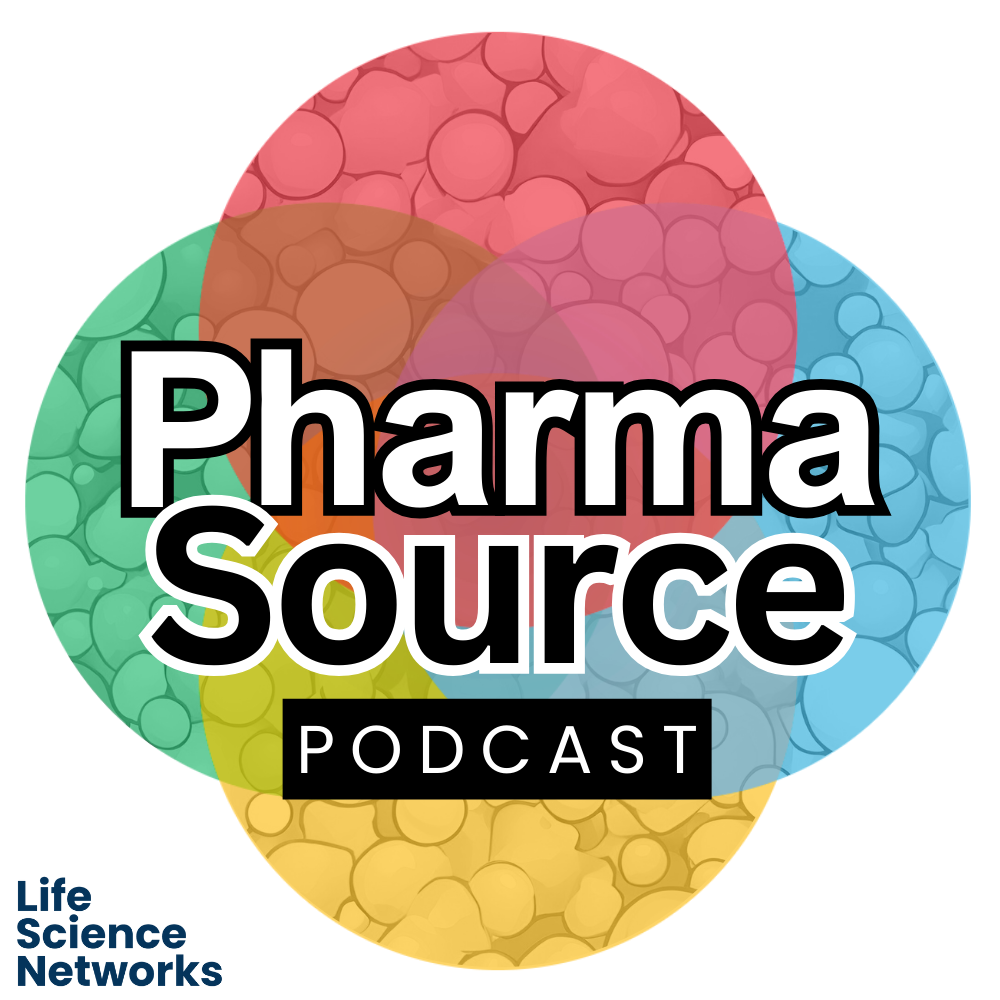“Being unique or special in something is crucial, a key factor in order to gain success in this field.” – Angela Molaschi
Angela Molaschi, Chief Commercial Officer at Fisiopharma, and Nicola Cadei, General Manager, bring decades of pharmaceutical industry experience to their leadership roles at this Italian injectable product specialist. Together, they’re expanding the company’s global presence while maintaining its reputation for quality and flexibility.
In the latest PharmaSource podcast episode ahead of CDMO Live 2025, Angela and Nicola explain how their medium-sized CDMO successfully navigates the competitive pharmaceutical manufacturing landscape by focusing on proactive customer service, quality excellence, and strategic capacity management.
Differentiation in a Competitive CDMO Landscape
Fisiopharma has built its competitive advantage around three key areas: structural organization, strategic approach, and technical expertise. As Angela explains, being a medium-sized CDMO allows them to offer something crucial that larger companies often struggle with:
“We are a medium-size CDMO, and this allows us to be very fast, very flexible, and able to support our customers with their needs in a fast and reactive way. We consider proactiveness one of our key values.”
Their strategic approach focuses on global reach rather than specializing in specific markets:
“We are not focused on a specific type of customer or a specific type of market. One of the key points of our strategy is to have a series of international approvals. So not focusing only on the US or on Europe or the most competitive markets, but to gain, each time, more approvals.”
This has resulted in an impressive regulatory footprint that includes FDA, EMA, ANVISA, and Chinese authorities’ approvals, with Japanese approval planned for the future. Technically, their expertise in injectable products—particularly sterile suspensions, biological products, and sterile powders—builds on manufacturing experience dating back to their founding in 1989.
Quality Management as a Core Mindset
For Fisiopharma, quality isn’t just a department—it’s embedded throughout the organization. Nicola emphasized how central this is to their operation:
“Quality management and regulatory compliance are key drivers for all our activities. Given the global nature of our business, we comply with the highest international standards.”
The company’s commitment to quality is reflected in its substantial quality team, which comprises approximately 35% of the total workforce. Their approach encompasses both systems and culture:
“To ensure quality consistency across all operations, we focus heavily on training and strong quality culture. We invest in internal and external training programs for our teams covering critical areas such as accepted practices, data integrity, software quality management, and good documentation practices.”
Their quality system is structured around six GMP pillars: quality, production, materials, facility equipment, laboratory controls, and packaging. Regular gap analysis, audits, and corrective and preventive actions (CAPA) maintain this system, while routine quality meetings bring together leadership and key functions to ensure transparency and continuous improvement.
Mastering Technology Transfer and Client Partnership
The transfer of knowledge, not just processes, stands at the heart of Fisiopharma’s approach to new client partnerships. Angela, who spent much of her career managing technology transfers, explained:
“Making the technology transfer is not just a copy and paste of something, but foresees the transfer of knowledge, the transfer of ability, of experience, of what the customer knows on the product.”
Their structured approach adapts to different client types—from large multinationals to virtual biotechs—while following a consistent flow:
“We start from the first approach, which is mainly a commercial approach, but in which we present our technical capabilities. Once we start discussing a real project, we don’t keep the discussion at a high level or make very high-level proposals. We like to deep dive into the product and what the customer needs from a product and process perspective.”
This upfront investment in understanding creates realistic proposals with accurate pricing, costs, and timelines. Once a project begins, they assign a dedicated project manager who serves as a single point of contact throughout the entire lifecycle—from kickoff through to commercial launch.
Communication remains central to their partnership approach:
“One of the key factors to gain success in this type of project is communication. It’s true in the transfer of knowledge, but it’s also true in the routine life during the project.”
Strategic Capacity Management
Balancing capacity between existing clients and new opportunities requires careful planning. Nicola outlined their three-dimensional approach:
“Fisiopharma is focused on three key dimensions: first, operational efficiency, which means segmentation of capacity, allocating production based on contract commitments and client segmentation. Second, strategic prioritization of customers based on long-term strategic value, volume commitments, and profitability. Third, capacity growth.”
The company is actively expanding its manufacturing capabilities, having introduced a third shift to maximize current assets while constructing a new plant for liquid products in vials and pre-filled syringes. This expansion allows them to maintain supply to existing partners while capturing new business opportunities.
Their cost management strategy similarly focuses on two pillars: continuous process verification and technological renewal. Through systematic analysis of production workflows, they identify opportunities to eliminate waste and reduce variability, creating a more stable cost structure. Meanwhile, technological investments ensure cost-effectiveness while maintaining quality and flexibility.
Sustainability Initiatives
Environmental responsibility has become increasingly important in CDMO selection. Fisiopharma addresses sustainability at both the site and project levels:
“We work on sustainability in two different ways,” Angela explained. “One is the general site initiative level, and the other is the specific project level.”
Site initiatives include energy-efficient equipment, a recently installed solar power system, and sustainable supply chain management. Project-level initiatives involve collaborations with clients, such as developing environmentally friendly secondary packaging to limit plastic use and optimizing tertiary packaging to reduce shipments.
Future Vision
Looking ahead, Nicola articulated a clear vision for Fisiopharma’s next three to five years:
“Our vision is to establish Fisiopharma as a leading, technologically advanced, highly efficient and flexible pharmaceutical manufacturing partner delivering injectable solutions for patients.”
This vision rests on three pillars: expanding production capacity with new state-of-the-art manufacturing lines, enhancing efficiency through technological investments and sustainable innovation, and strengthening client partnerships by expanding formulation and manufacturing capabilities.
When asked for her one piece of advice for companies seeking a CDMO partner, Angela emphasized the importance of careful selection:
“Making pharmaceutical products is quite complex. When you select a partner from a customer perspective, it’s a sort of marriage. You invest a lot, and you would like to secure your supply chain. The relationship between the customer and the CDMO is really a partnership, and the partnership shall start from a good knowledge of one another, and trust in one another.”
She recommends biotechs and pharmaceutical companies deeply understand potential CDMO partners during the selection phase—looking beyond technical capabilities to identify the partner that best fits their specific needs, whether they involve small volumes, high volumes, standard molecules, or other requirements.
Meet Fisiopharma at CDMO Live (7-8 May, Rotterdam). Download the agenda












 Stay ahead of trends and best practices
Stay ahead of trends and best practices
